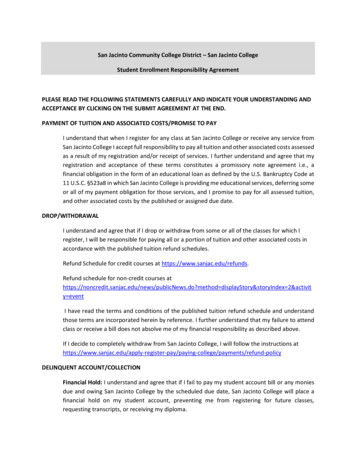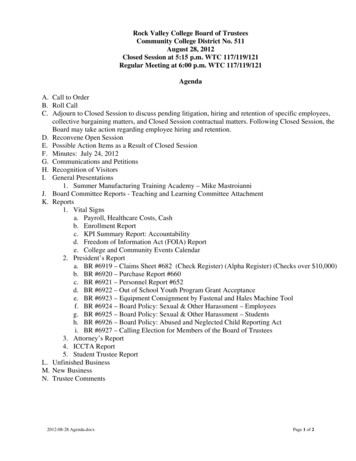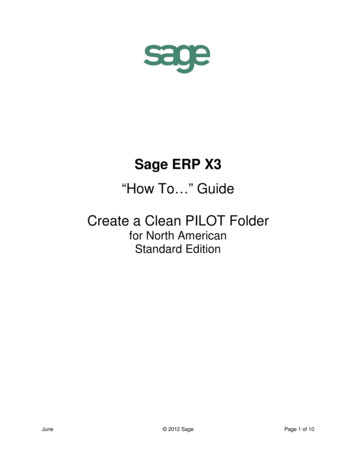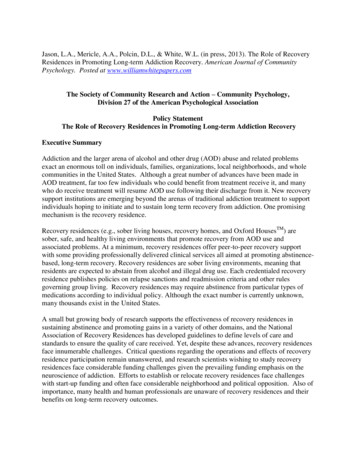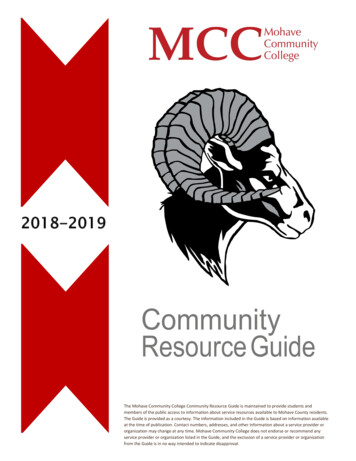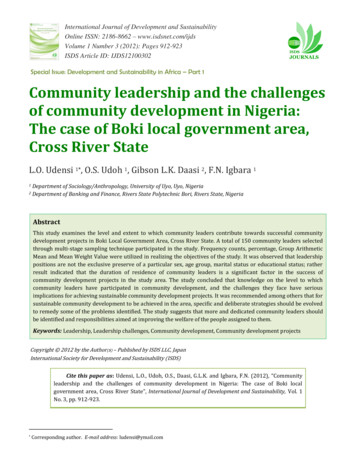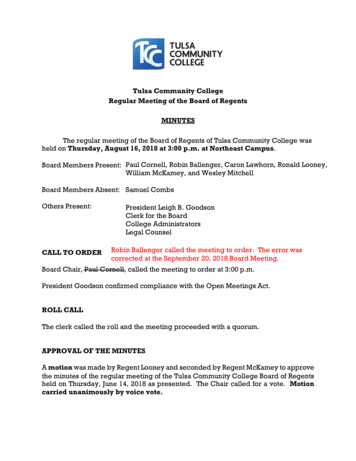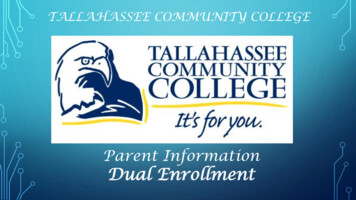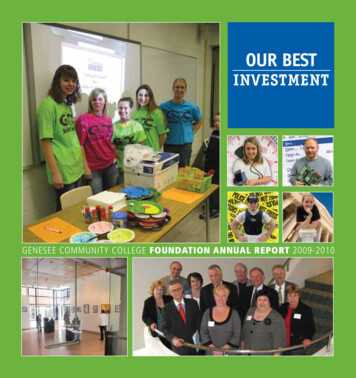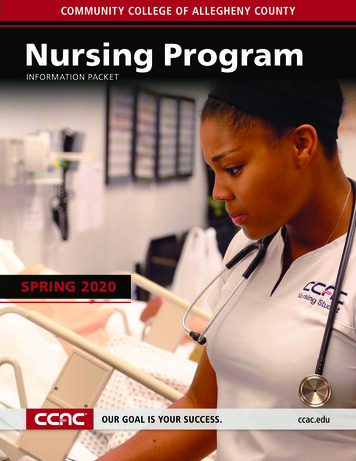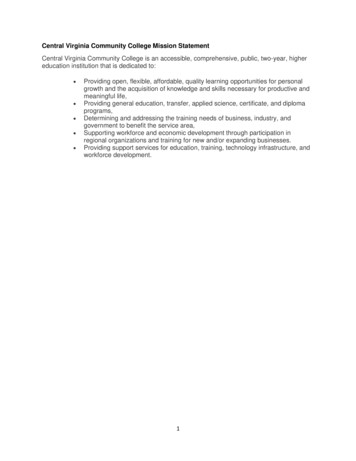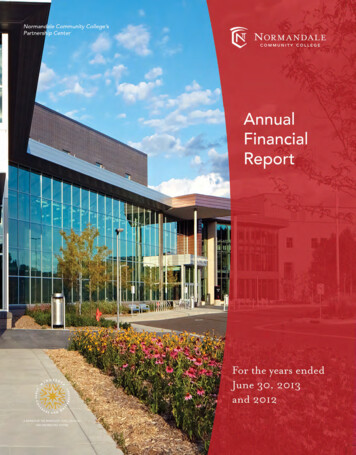
Transcription
NORMANDALE COMMUNITY COLLEGEA MEMBER OF THEMINNESOTA STATE COLLEGES AND UNIVERSITIES SYSTEMANNUAL FINANCIAL REPORTFOR THE YEARS ENDED JUNE 30, 2013 and 2012Prepared by:Normandale Community College9700 France Ave. S.Bloomington, MN 55431
Upon request, this publication is available in alternate formats by calling one of the following:General number (651) 201-1800Toll free: 1-888-667-2848For TTY communication, contact Minnesota Relay Service at 7-1-1 or 1-800-627-3529.
NORMANDALE COMMUNITY COLLEGEANNUAL FINANCIAL REPORTFOR THE YEARS ENDED JUNE 30, 2013 and 2012TABLE OF CONTENTSINTRODUCTIONPageTransmittal Letter . 5Organizational Chart . 9FINANCIAL SECTIONIndependent Auditor’s Report . 12Management’s Discussion and Analysis . 15Basic Financial StatementsStatements of Net Position . 20Statements of Revenues, Expenses, and Changes in Net Position . 21Statements of Cash Flows . 22Notes to the Financial Statements . 24REQUIRED SUPPLEMENTARY INFORMATION SECTIONSchedule of Funding Progress for Net Other Postemployment Benefits . 43SUPPLEMENTARY SECTIONReport on Internal Control Over Financial Reporting and on Compliance andOther Matters Based on an Audit of Financial Statements Performedin Accordance with Government Auditing Standards . 461
This page intentionally left blank2
INTRODUCTION3
This page intentionally left blank4
November 15, 2013Dr. Steven J. Rosenstone, ChancellorMinnesota State Colleges and UniversitiesWells Fargo Place30 7th Street E., Suite 350St. Paul, MN 55101-7804Dear Chancellor Rosenstone,I am pleased to submit to you the audited Annual Financial Report for Normandale Community College forthe fiscal year ending June 30, 2013. This report includes the financial statements and disclosuresnecessary to accurately present the College’s financial position and results of our operation for the year.The financial statements are presented in accordance with U.S. Generally Accepted Accounting Principlesas prescribed by the Governmental Accounting Standard Board.Within the financial statements, which were audited by the firm of Kern, Dewenter, Viere, Ltd., you will findthe statements of net position, statements of revenue, expense and changes in net position, and statements ofcash flows. For a summary review and explanation of the financial statements, please review theManagement Discussion and Analysis section of this report. The management of the College is responsiblefor assuring the accuracy, reliability, fairness and completeness of the information in this report.Normandale Community College is committed to providing an extraordinary education for all students;providing system leadership in support services; and being the partner of choice in transfer and community andworkforce development. It is my pleasure to share a few successes we have experienced this past year thatsupport the System’s Strategic Framework.Ensure Access to an Extraordinary Education for all Minnesotans Our partnerships with Minnesota State University, Mankato and Metropolitan State Universitycontinue to grow; over 450 partner students are currently taking classes at Normandale. Studentshave baccalaureate opportunities in Accounting, Business Administration, Computer Science,Dental Hygiene, and Nursing. We also support the Twin Cities Engineering program and mastersdegree opportunities in Accounting and Business Administration. To encourage thesepartnerships we have led a system-wide team to develop seamless student support services, and wehave partnered with the system office to improve our infrastructure for data sharing. We areexcited about the opportunity to expand the breadth and depth of these partnerships, and to createprocesses for academic program planning, marketing, support services, and data sharing thatinstitutions across the system can replicate. Our assessment program continues to focus faculty on identifying and evaluating our learningoutcomes. We dedicate over 100,000 annually to sustain coordinated assessment activities inAcademic and Student Affairs. This year we completed articulation of learning outcomes for over 90percent of our programs, and we are developing a toolkit for mapping course and program outcomesto the college’s Core Learning Outcomes. Over 300 students, when filling out their Free Application for Federal Student Aid (FAFSA) forms,self-reported eligibility for food assistance; in an informal survey done by the Center for ExperientialEducation, over 25 percent self-reported being hungry at school and not having money for food. Torespond to this need, the college partnered with Good in the ‘Hood to create Campus Cupboard, anon-campus food shelf. In fiscal year 2013, the Cupboard served 517 unique students over 4,351 visitsand engaged 54 student volunteers in 910 hours of service learning.5
We redesigned several committees to provide more systematic oversight of placement, developmentaleducation, new student experience, and satisfactory academic progress. The Student Success Councilis currently working with several metro community colleges and Asmussen Research & ConsultingLLC to study student progress through developmental education. The goal is to reduce time spent inremediation and to increase the number of students who successfully complete developmentalcoursework. We continue to participate in the Carnegie Statway/Quantway initiative to decrease the time tocompletion of college-level math. This year we launched the Accelerated Learning Program (ALP) inReading and Composition to decrease the time to college-level in those areas as well. Normandale faculty and administrators continue to serve as active participants in the MinnesotaAlliance for Nursing Education (MANE). We have secured program and individual courseapprovals through our AA&SC process, and we hosted two faculty institutes to educate systemNursing faculty about this curricular change. The new curriculum encourages a moreprogrammatic approach to learning, so students revisit content at increasing levels ofsophistication. The curriculum also encourages collaboration with general education courses asNursing faculty identify needed general education competencies. We anticipate that our 2014-2017 Strategic Plan will focus on expanding more experiential and activelearning across the curriculum. We continue to maintain a Faculty Development Center andinstructional support staff to work with faculty in this effort. We are also redesigning our TeamLearning structure to add five Center for Teaching and Learning (CTL) Division Leaders. Thisapproach will increase faculty participation in organizing faculty development activities and improvethe responsiveness of our training efforts. Several Normandale faculty were recognized recently for their outstanding work. Anne Byrdreceived the Gold Medallion award at the Region V Kennedy Center America College TheatreFestival for her contributions to theatre education. Dan Creed was a finalist for the OutstandingInternational Educator Award, and Robert Frame was a finalist for the Eugene AsherDistinguished Teaching Award for excellence in history education. Four faculty—ChristopherDanielson, Susan Krook, David Lake, and Ben Maegi—were identified as 2013 Board of TrusteesOutstanding Educators. We continue to support the system’s Quality Matters initiative. We will complete five course reviewsthis year, and we will launch both a Quality Matters Users Group and a Desire2Learn AdvancedUsers Group to provide more peer support to our experienced online instructors. Our goal continuesto be a course success rate that equals or exceeds the current success rate for face-to-face courses. In2013, our average success rate was 68 percent for online and 81 percent for face-to-face.Be the Partner of Choice to Meet Minnesota’s Workforce and Community Needs To support student retention and completion, we’ve made a number of recent investments:oOver 50,000 additional investment in Supplemental Instruction to provide more targetedsupport to students in their courses. Use of SI has increased from 19 courses in fiscal year2011 to 87 courses in fiscal year 2013. We also hired a permanent director to coordinatecontinued expansion of the program.oOver 100,000 to improve our first-semester experience for students, including aredesigned online orientation program, more technology support for counselors andadvisors, expanded use of Student Success Mentors, and a redesign of spaces in the studentservices area to bring the Multicultural Center and the Veterans Center to a more centrallocation.6
o Almost 30,000 in changing the culture to support student success. Initiatives includeddeveloping campus-wide customer service training, which was piloted last year inAdmissions, Financial Aid, Records, the Business Office and our Information Desks. Weimplemented the StrengthsQuest assessment with our Pathways to College Success courses,creating a strengths-based approach to coaching students. We also sent a team to aconference on integrated student services with the intent of creating more seamless servicesfor students.We continue to pursue grant opportunities that meet our mission of student success andcommunity and workforce development.oA Minnesota Job Skills Partnership grant for 275,000 to provide customized trainingservices to Andersen Corporation.oA 600,000 National Science Foundation grant to support Science, Technology,Engineering, and Math (STEM) scholarships. The college received 102,000 in year one,with an additional 500,000 to be awarded for years two through four.oA 15,000 grant to the Normandale Foundation from Delta Dental of Minnesota todevelop an inter-professional community health worker/navigator program.oA 900,000 three-year grant from the U.S. Department of Health and Human Services tomeet the Health IT training needs of rural Minnesota. Normandale Community Collegepartnered with regional health care networks, other Minnesota State Colleges andUniversities (MnSCU) institutions, and private companies in pursing this grant.We have seen decreases in our incoming adult populations and fall-to-fall retention of adultstudents decreased 4.4 percent. To better understand these dynamics, Normandale is partneringwith the Center for Adult and Experiential Learning (CAEL) to do an audit of our programs andservices to identify ways we can better support adult students on campus. Results will inform theimplementation of our 2014-2017 Strategic Plan.Deliver to Students, Employers, Communities, and Taxpayers the Highest Value / Most AffordableOption by Designing the Minnesota State Colleges and Universities System of the Future Normandale continues to participate in the Campus Service Coop for bank reconciliation andpayroll. Human Resources is sponsoring a Luoma Action Project team to develop a strategicplanning protocol to determine which human resource services to outsource to a service coop,which services to provide internally, and which services to host for other MnSCU institutions. We continue to reduce waste through process improvements. Current processes being reviewedand improved include job auditing, non-faculty searches, faculty transactions, and employeeonboarding. A project team is developing a process to regularly identify high value processimprovement opportunities; the team is also partnering with the Minnesota Department ofAdministration to provide Lean training to more employees. Normandale is part of a beta testing group for Maximizing Resources for Student Success, aproject sponsored by the National Higher Education Benchmarking Institute, the National Centerfor Higher Education Management Systems (NCHEMS) and the American Institutes of Research(AIR) to benchmark costs associated with student success initiatives. We continue to maintain a Gold Rating on the Accountability Dashboard for our CompositeFinancial Index and our Facilities Condition Index. Current strategies include efficient staffing andfacilities usage and leveraging the College’s size for economies of scale.7
We expanded the use of Right Now customer relations management software in several areas,including Planning, Institutional Research and Effectiveness; Human Resources; BuildingServices; the Business Office; and Marketing. Directing common inquiries to prepared responsesets will free staff to focus on high-value activities.We are proud of what we have accomplished at Normandale Community College this past year. I lookforward to the transition in leadership knowing that we continue to be good stewards of our financialresources while continually reinvesting in programs and services that support our students and community.Respectfully,Joseph Opatz, PhD8
The financial activity of the Normandale Community College is included in this report. The College is oneof 31 colleges and universities included in the Minnesota State Colleges and Universities Annual FinancialReport which is issued separately.The College’s portion of the Revenue Fund is also included in this report. The Revenue Fund activity isincluded both in the Minnesota State Colleges and Universities Annual Financial report and in a separatelyissued Revenue Fund Annual Financial Report.All financial activity of Minnesota State Colleges and Universities is included in the state of MinnesotaComprehensive Annual Financial Report.10
FINANCIAL SECTION11
INDEPENDENT AUDITOR’S REPORTBoard of TrusteesNormandale Community CollegeMinnesota State Colleges and UniversitiesSt. Paul, MinnesotaReport on the Financial StatementsWe have audited the accompanying financial statements of Normandale Community College, a campusof Minnesota State Colleges and Universities, as of and for the years ended June 30, 2013 and 2012, andthe related Notes to the Financial Statements, which collectively comprise the College’s basic financialstatements as presented.Management’s Responsibility for the Financial StatementsManagement is responsible for the preparation and fair presentation of these financial statements inaccordance with accounting principles generally accepted in the United States of America; this includesthe design, implementation and maintenance of internal control relevant to the preparation and fairpresentation of financial statements that are free from material misstatement, whether due to fraud orerror.Auditor’s ResponsibilityOur responsibility is to express opinions on these financial statements based on our audit.We conducted our audit in accordance with auditing standards generally accepted in the United States ofAmerica and the standards applicable to financial audits contained in Government Auditing Standards,issued by the Comptroller General of the United States. Those Standards require that we plan andperform the audit to obtain reasonable assurance about whether the financial statements are free frommaterial misstatement.An audit involves performing procedures to obtain audit evidence about the amounts and disclosures inthe financial statements. The procedures selected depend on the auditor’s judgment, including theassessment of the risks of material misstatement of the financial statements, whether due to fraud orerror. In making those risk assessments, the auditor considers internal control relevant to the College’spreparation and fair presentation of the financial statements in order to design audit procedures that areappropriate in the circumstances, but not for the purpose of expressing an opinion on the effectiveness ofthe College’s internal control. Accordingly, we express no such opinion. An audit also includesevaluating the appropriateness of accounting policies used and the reasonableness of significantaccounting estimates made by management, as well as evaluating the overall presentation of thefinancial statements.12
We believe that the audit evidence we have obtained is sufficient and appropriate to provide a basis forour audit opinions.OpinionsIn our opinion the financial statements referred to above present fairly, in all material respects, thefinancial position of Normandale Community College, as of June 30, 2013 and 2012, and the respectivechanges in financial position and cash flows for the years then ended in accordance with accountingprinciples generally accepted in the United States of America.Other MattersRequired Supplementary InformationAccounting principles generally accepted in the United States of America require that the Management’sDiscussion and Analysis, which follows this report letter, and the Schedule of Funding Progress – OtherPost Employment Benefits as listed in the table of contents, be presented to supplement the basicfinancial statements. Such information, although not a part of the basic financial statements, is requiredby GASB, who considers it to be an essential part of financial reporting for placing the basic financialstatements in an appropriate operational, economic or historical context. We have applied certainlimited procedures to the required supplementary information in accordance with auditing standardsgenerally accepted in the United States of America, which consisted of inquiries of management aboutthe methods of preparing the information and comparing the information for consistency withmanagement’s responses to our inquiries, the basic financial statements and other knowledge weobtained during our audit of the basic financial statements. We do not express an opinion or provide anyassurance on the information because the limited procedures do not provide us with sufficient evidenceto express an opinion or provide any assurance.Other InformationThe accompanying introductory sections identified in the Table of Contents has not been subjected tothe auditing procedures applied in the audit of the basic financial statements, and accordingly, we do notexpress an opinion or provide any assurance on it.Other Reporting Required by Government Auditing StandardsIn accordance with Government Auditing Standards, we have also issued our report dated November 15,2013 on our consideration of the College’s internal control over financial reporting and our tests of itscompliance with certain provisions of laws, regulations, contracts and grant agreements and othermatters. The purpose of that report is to describe the scope of our testing of internal control overfinancial reporting and compliance and the results of that testing, and not to provide an opinion on theinternal control over financial reporting or on compliance. That report is an integral part of an auditperformed in accordance with Government Auditing Standards and in considering the College’s internalcontrol over financial reporting and compliance.KERN, DEWENTER, VIERE, LTD.Bloomington, MinnesotaNovember 15, 201313
This page intentionally left blank14
MANAGEMENT’S DISCUSSION AND ANALYSIS (Unaudited)INTRODUCTIONThe following discussion and analysis provide an overview of the financial position and activities of NormandaleCommunity College, a member of Minnesota State Colleges and Universities, at June 30, 2013 and 2012
continue to grow; over 450 partner students are currently taking classes at Normandale. Students have baccalaureate opportunities in Accounting, Business Administration, Computer Science, Dental Hygiene, and Nursing. We also support the Twin Cities Engineering program and masters degree
